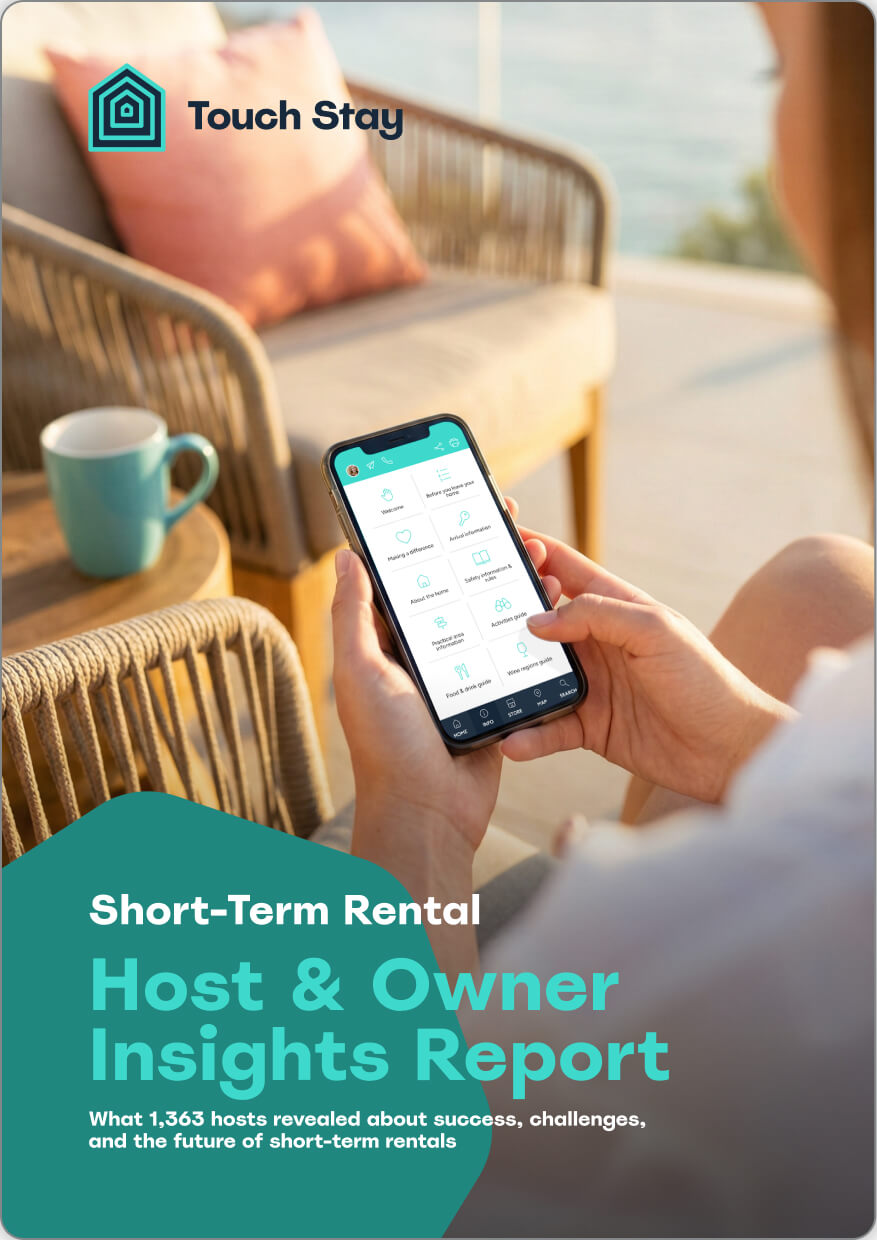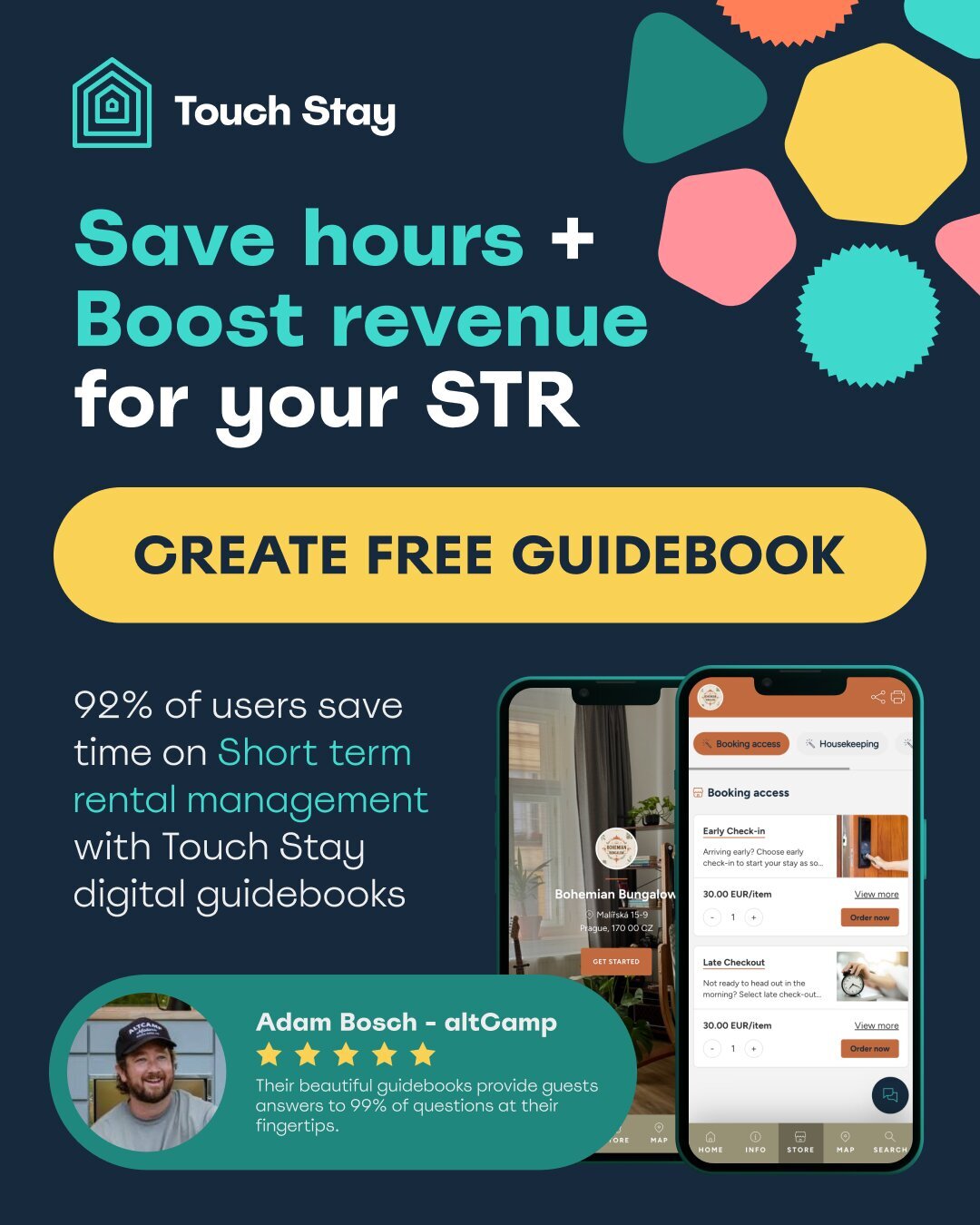Investing in an Airbnb property can be an exciting and potentially lucrative venture, but it’s not without challenges. As we move into 2025, the short-term rental market continues to evolve, shaped by new regulations, shifting traveler preferences, and emerging trends. Whether you're a first-time investor or looking to expand your portfolio, knowing the ins and outs of Airbnb investments is crucial.
This guide will walk you through everything you need to know before buying an Airbnb, from market research, financial planning and property management tips, to using a Touch Stay digital guidebook to streamline the entire process. With thorough preparation, you can turn your Airbnb investment into a profitable and rewarding business.
Read on to discover:
- The future state of the Airbnb market in 2025
- Research you need to do before buying an Airbnb
- Financial considerations before buying an Airbnb
- How to set your Airbnb up for success
- Challenges of investing in an Airbnb
- Benefits of investing in an Airbnb
- Should you invest in an Airbnb in 2025?
- FAQs about buying an Airbnb in 2025
Looking to get the most out of your Airbnb? Touch Stay digital guidebooks have been shown to save hosts significant time, boost guest satisfaction, increase direct bookings, and increase revenue through upsells.
Drop your Airbnb link to get started.
Get your custom guest guide in 60 seconds. No card required.
The future state of the Airbnb Market in 2025
The short-term rental market is booming, but it’s also facing significant changes. Airbnb hosts and investors must keep pace with evolving trends to ensure profitability.
Trends shaping the market
1. Increasing regulation
Governments worldwide are introducing stricter short-term rental laws to address housing shortages and neighbourhood disruptions:
- Cities like New York and Barcelona now require permits and enforce caps on the number of nights properties can be rented annually
- Coastal and resort areas are also enacting zoning restrictions to balance tourism with local housing needs
2. Market growth and saturation
While the number of Airbnb listings increased by 15% globally in 2024, many urban markets are nearing saturation. Investors are finding better opportunities in suburban and rural areas, where competition is lower, and demand is growing.
3. Shifting guest preferences
In 2025, travellers seek:
- Eco-friendly stays: properties with sustainable practices attract environmentally conscious guests
- Remote work amenities: high-speed internet and dedicated workspaces are must-haves
- Unique experiences: guests favour properties offering distinctive features, like treehouses or themed interiors
Data to consider
- Occupancy rates: global averages hovered around 60% in 2024 but varied significantly by region
- Revenue potential: properties in rural areas saw a 20% increase in revenue compared to urban markets
Pro tip: stay ahead of market trends with a Touch Stay digital guidebook for Airbnb hosts, designed to enhance guest experiences and improve reviews.
Research you need to do before buying an Airbnb
Investing in an Airbnb without conducting thorough research is risky. Here’s how to start.
Analyse market trends
Understanding your target area’s market conditions is essential. Look for data on:
- Occupancy rates: how often properties are booked in the area
- Nightly pricing: average rates for comparable listings
- Demand drivers: local attractions, seasonal tourism trends, and business travel
Tools to use:
- AirDNA: provides insights into market performance.
- Mashvisor: analyses property potential.
- Local tourism reports: identify trends specific to your area.
Evaluate the location
The right location is critical to an Airbnb’s success. Consider:
- Proximity to attractions: properties near beaches, national parks, or cultural landmarks tend to perform well.
- Accessibility: easy access via motorways or public transportation is a plus.
- Competition: research how many similar listings exist and what they offer.
Top locations for 2025:
- Unique rural escapes offering tranquility and natural beauty.
- Urban areas with flexible regulations.
- Suburban properties near major cities.
Check local laws and regulations
Regulations for short-term rentals vary widely. Investigate:
- Permit requirements: many cities mandate registration and specific licensing
- Rental caps: some regions limit how many days a year you can rent your property
- Taxes: be prepared to pay occupancy, local, and income taxes
For more info, check out our comprehensive blog on how to maximise Airbnb tax deductions.
Financial considerations before buying an Airbnb
Owning an Airbnb involves significant upfront and ongoing costs. Planning your finances is crucial.
Calculate all costs involved
When budgeting, include:
- Initial costs:
- Down payment (typically 10–20% of the property price)
- Closing costs, including legal fees and taxes
- Renovation and furnishing expenses
- Ongoing Costs:
- Monthly mortgage payments
- Utilities, internet, and property maintenance
- Cleaning services and supplies
- Short-term rental insurance to cover potential damages
- Airbnb fees (usually 3% of booking revenue)
Estimate your ROI (Return on Investment)
Your Airbnb investment should be profitable. Key metrics to evaluate:
- Cap rate: divide net operating income by property value. Aim for 8% or higher
- Cash-on-cash return: measure annual cash flow as a percentage of total cash invested
Use tools like:
- AirDNA Rentalizer: this handy pricing tool estimates potential revenue and occupancy rates
- Spreadsheet calculators: for detailed financial planning
Financing options for Airbnb investments
Securing financing can be challenging, especially for first-time investors. Explore:
- Conventional mortgages: require a strong credit score and proof of income
- DSCR (Debt Service Coverage Ratio) loans.: Based on property income potential rather than personal income
- Hard money loans: suitable for quick purchases but with higher interest rates
- Guarantor Loans: Ideal for investors with limited credit history or lower income. A guarantor (such as a family member) provides additional security, increasing the chances of loan approval.
Learn how to win guests and investors with our B&B business plan (plus a free template).
How to set your Airbnb up for success
Once you've purchased your Airbnb property, the next step is preparing it for guests.
Focus on amenities that guests value in 2025
Guests are willing to pay more for properties with premium features:
- Fast Wi-Fi: essential for remote workers and digital nomads
- Unique amenities: hot tubs, fire pits, and game rooms can set your listing apart
- Pet-friendly options: attract families and pet owners
Invest in marketing and presentation
Your listing is your property’s first impression.
- Professional photos: high-quality images increase booking rates
- Optimised descriptions: use engaging language and local keywords to improve search visibility
- Standout features: highlight what makes your property unique, like "cosy cabin with mountain views."
Pro tip: you only have about 8 words (and a picture) to convince potential guests to click on your Airbnb listing. Discover how to attract guests and get those clicks up with our ultimate guide to Airbnb listing names.
Decide on self-management or hiring help
Managing your Airbnb involves significant time and effort. Choose between:
- Self-management: use tools like Hostaway to automate bookings and communication
- Property management services: for a fee, these services handle operations like guest check-ins and maintenance
Pro tip: a digital guidebook can save time and answer guest questions automatically - plus Touch Stay integrates seamlessly with all the leading Property management Systems.
Challenges of investing in an Airbnb
While the potential rewards are enticing, Airbnb investments come with challenges.
Navigating regulatory changes
Airbnb regulations are constantly evolving.
- Stay informed by following local government updates
- Join landlord associations for the latest legal developments
Dealing with guest issues
Common problems include:
- Damages or theft: protect yourself with a comprehensive insurance policy
- Negative reviews: minimise these by addressing complaints promptly
- Cancellations: have clear policies to protect your revenue
Discover proven strategies to reduce Airbnb cancellations and safeguard revenue.
Handling seasonal demand fluctuations
Off-peak seasons can be tough. Strategies to maintain bookings include:
- Offering discounts for long-term stays
- Marketing to niche groups, like remote workers or retirees
Benefits of investing in an Airbnb
Despite challenges, investing in an Airbnb has distinct advantages.
Higher income potential
Short-term rentals can earn significantly more than traditional leases, especially in high-demand locations.
Flexibility
You can use the property yourself during vacancies, blending business with personal enjoyment.
Asset appreciation
Property values typically increase over time, adding long-term financial gains to your short-term rental income.
Final advice: should you invest in an Airbnb in 2025?
Investing in an Airbnb can be a rewarding venture if you approach it strategically. To succeed:
- Do your research: analyse market trends, regulations, and location dynamics
- Plan your finances: budget for all expenses and calculate potential returns
- Prepare for challenges: stay informed about legal changes and adapt to market demands
While it’s not a guaranteed path to wealth, careful planning and execution can turn your Airbnb investment into a profitable venture. Take the leap, and let your Airbnb journey begin!
Ready to enhance your Airbnb hosting experience? Start your 14-day free trial today and discover how Touch Stay’s digital guidebooks can help you save time, improve guest communication, and increase your property’s success.
FAQs about buying an Airbnb in 2025
Yes, but profitability depends on factors like location, market demand, and effective property management. While urban markets may be saturated, suburban and rural areas with unique offerings are showing strong performance. Use tools like AirDNA to analyse market potential before investing.
Some common risks include:
- Regulatory changes: stricter local laws could limit rental opportunities
- Seasonal fluctuations: lower occupancy during off-peak months
- Guest issues: potential for damages, cancellations, or complaints
Staying informed and having contingency plans can mitigate these risks.
Location is key. Properties near tourist attractions, with good accessibility and minimal competition tend to perform best. Unique features, such as eco-friendly designs or family-friendly amenities, can also make a property stand out.
To calculate ROI:
- Cap rate: divide net operating income by property value
- Cash-on-cash return: divide annual cash flow by total cash invested - use tools like AirDNA’s Rentalizer to estimate earnings based on your target area
It depends on your availability and experience:
- Self-management: allows for more control and lower costs but requires time and effort
- Property manager: provides hands-off management but charges a fee (typically 10–30% of revenue)
For a balance, consider using property management tools like Touch Stay’s digital guidebooks for Airbnb to streamline operations and guest communication.

Ned
Ned has clocked up over 11 years in digital marketing and comms, with a strong focus on creating engaging content for a range of brands and agencies. When he’s not writing, he can be found digging for records, peering through his telescope at the night sky, or onboard his local lifeboat where he volunteers as a crewmember.
Be the first to know!
Join our newsletter for early access to:
- ✅ Free guides
- ✅ Pro tips & tricks
- ✅ Time saving tutorials
- ✅ Latest blog posts
- ✅ Checklists & templates






















